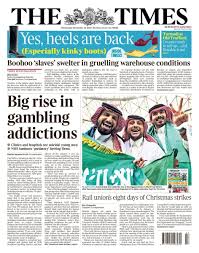"Free Bets and Festive Frenzy: The Times’ Spin on Gambling Addiction"
Festive Gambling: The Convenient Villain
Ed Grimshaw
12/28/20243 min read


The festive season—a time for reflection, goodwill, and, if The Times has its way, a moral panic about gambling addiction. In their recent article, they highlight a 50% increase in referrals to NHS gambling clinics, painting a bleak picture of Christmas ruined by free bets and Boxing Day football. But let’s not get carried away by the flashing lights of their narrative. Because, as with many statistical shockers, context is everything—and context is where The Times conveniently falters.
50% of Nothing Is Still Nothing
First, let’s tackle this headline-grabbing 50% increase. Yes, 1,914 patients referred to NHS clinics in six months is higher than the 836 referrals in the same period last year. But in a country of 67 million, those numbers barely register a blip. Even the Gambling Commission estimates that only 0.4% of adults are problem gamblers—roughly 268,000 people. A 50% rise in referrals doesn’t suddenly transform gambling addiction into the epidemic The Times makes it out to be.
Compare this to other vices like smoking or alcohol. According to NHS data, 6.4 million adults smoked in England in 2022, while around 600,000 people are treated annually for alcohol addiction. Yet, we don’t see The Times dedicating entire columns to the predatory practices of alcohol advertising or the tobacco industry’s historical sins.
To be clear, gambling addiction is a serious issue for those affected, but magnifying its prevalence with alarmist headlines is disingenuous at best and manipulative at worst.
Festive Gambling: The Convenient Villain
Boxing Day, The Times informs us, is a “perfect storm” of sports fixtures and predatory advertising. It’s undoubtedly true that betting firms ramp up their marketing efforts during high-profile events. But is this any different from supermarkets pushing booze at Christmas or fast-food chains enticing us with festive burgers? If anything, gambling adverts are far easier to ignore—your TV remote has a mute button, after all.
And let’s not forget: gambling isn’t the only festive vice wreaking havoc on the NHS. Christmas overindulgence in alcohol contributes to more than 10,000 alcohol-related hospital admissions in December alone, while obesity costs the NHS over £6 billion annually. Yet these well-documented crises don’t receive the same level of outrage—or perhaps they’re just not as fashionable a target.
The Times’ Selective Focus
If The Times truly wanted to address the complexities of gambling harm, they might have dug into the broader context. Why, for example, has the government taken so long to implement a statutory levy on gambling profits, despite years of warnings about its necessity? Why do firms continue to be allowed to advertise “free bets” when they’re anything but free?
Instead, we’re treated to an oversimplified narrative, complete with a dose of seasonal scaremongering. The article focuses heavily on “young men driven to suicide” by sports betting—a tragic reality for some, but one that feels selectively weaponized here. Where’s the same energy for alcohol-related suicides or drug overdoses, both of which far outstrip gambling-related fatalities?
The NHS: Overwhelmed, Yes—but Let’s Be Real
The NHS gambling clinics, now numbering 15 across England, are doing vital work, but let’s not pretend they’re drowning under the weight of the UK’s gambling epidemic. The 1,914 referrals over six months pale in comparison to the 1.2 million people referred annually for mental health conditions like anxiety or depression.
Moreover, gambling addiction treatment often overlaps with these other conditions, muddying the waters further. Are we diagnosing more gambling addicts, or are we simply becoming better at identifying underlying mental health issues that manifest through gambling? The Times doesn’t bother to ask.
A Misplaced Moral Panic?
Let’s be clear: gambling addiction is real, and for those affected, it’s devastating. But framing the issue as a rapidly escalating epidemic ignores reality. The Betting and Gaming Council’s claim that 22.5 million Brits gamble monthly without issue isn’t just industry spin—it’s a statistical counterweight. Most people who place a bet on the Grand National or have a flutter on Boxing Day football aren’t spiralling into addiction.
Yes, the industry has a responsibility to curb its more predatory practices, like the misleading “free bets” and incessant advertising. And yes, the government and regulators like the Gambling Commission need to do more than wave through vague policy proposals. But let’s not pretend that gambling is the root of all societal ills while ignoring the far greater harm caused by alcohol, smoking, and obesity.
Final Thoughts: Is The Times Biased?
The Times appears to have taken the easy route here: cherry-picking alarming stats, painting gambling firms as pantomime villains, and overlooking broader context. It’s a classic case of moral panic dressed up as journalism, where the aim seems to be outrage rather than understanding.
If The Times truly wants to tackle the gambling industry’s flaws, let’s have a serious conversation about regulation, advertising, and the role of personal responsibility. Until then, articles like this will remain little more than clickbait for the morally outraged—a festive story as hollow as a Christmas cracker.
